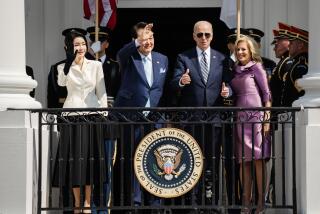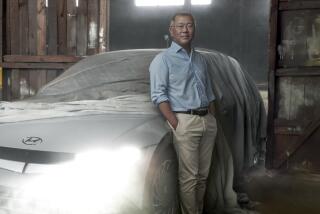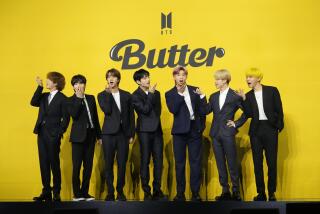Hyundai Group’s Steel Plan Splits Nation : South Korea: Proposal to build $10-billion mill fuels debate over the need for industry competition.
- Share via
SEOUL — South Korea’s Hyun dai Group has a history of stirring up public opinion. In the 1992 presidential election, its founder, Chung Ju Yung, caused a political earthquake by mounting a highly charged campaign against the eventual winner, President Kim Young Sam.
This time around, the nation’s largest conglomerate is dividing the country with an ambitious plan to build South Korea’s second steel mill at a cost of $10 billion.
Some industrialists and analysts favor the plan, which is for an integrated steel mill with annual production capacity of nearly 10 million tons. These people say South Korea’s fast economic growth will require an equally fast increase in steel production capacity.
But others worry about a worldwide glut in supply by the time Hyundai’s steel mill is completed.
More fundamentally, the debate centers on whether competition is needed for the Korean steel industry, currently monopolized by Pohang Iron & Steel Co. (POSCO). POSCO is the world’s second-largest steel producer, after Japan’s Nippon Steel Corp.
The debate started a few weeks ago, when speculation about the plan first spread. It became hotter this week, as most Seoul newspapers presented a detailed construction plan, quoting Hyundai executives and government officials.
According to the reports, Hyundai will invest $10 billion to build three blast furnaces with a capacity of 3.1 million tons each, possibly in the southeastern city of Pusan. Hyundai officials were quoted as saying the group’s construction, engineering and heavy equipment subsidiaries will take 39 months to build the plant once they start.
Park Il Kwon, a Hyundai Group spokesman, refused to confirm the reports but said the group’s steel-product manufacturing subsidiaries, including Hyundai Pipe Co., have carried out some feasibility studies.
These include long-term projections of Hyundai’s own steel demands, he said.
Analysts say Hyundai’s steel needs for its car, shipbuilding, construction and electronics subsidiaries are estimated at 6 million tons a year, making it feasible for the group to have its own steel mill.
“It is no secret that we have hoped to have our own steel mill ever since POSCO was created in the late 1960s,” Park said.
With annual capacity of about 21 million tons, POSCO is perhaps the world’s most competitive steelmaker, because its plants are among the most advanced, analysts say.
Aided by the strong yen, which makes Japanese steel more expensive in overseas markets, POSCO’s earnings in 1993 rose 59% over 1992 to $368 million, on revenue of $8.6 billion.
To build its own steel mill, Hyundai would have to overcome many hurdles.
In theory, Hyundai doesn’t need to get a green light from the government for the project. But in practice, it would need approval to borrow foreign funds, select a mill site, import foreign technology and affect the environment.
For that reason, it is reportedly working to woo public opinion, which could influence government decision making.
It will get an important platform at a public seminar next week on ways to develop the nation’s steel industry. News reports say Hyundai will strongly present its case at the seminar.
It may have to. Signs from the government aren’t favorable so far.
Park Woon Suh, vice minister of trade, industry and energy, said last week he believes South Korea needs facilities to process steel products, not make crude steel.
The state-run Korea Institute for Economics and Technology, which often represents government views, recently said in a report that a new entry into crude steel production isn’t desirable.
It said South Korea’s crude steel demand will be about 48.4 million tons in 2001, only 1.5 million tons more than supply at that time, an easy gap to fill with imports.
The report said the current extra demand on Korean steelmakers, notably POSCO, will soon disappear as the yen stabilizes and world consumption falls.
“You cannot predict future demands based solely on the present situation,” said Kim Joo Han, a key researcher for the report. “There is a tendency to overestimate the competitiveness of Korean steel.”
Looking at the bigger picture makes the concerns of Kim and other critics of the plan more understandable.
Many Asian countries, including China, Taiwan, Thailand and Indonesia, are racing to expand their steel production capacity, risking a glut in the region in a few years.
The Chinese government wants to expand its national annual crude steel output to 100 million tons by 2000. China Steel Corp. of Taiwan plans to boost its annual capacity by 30% to 8 million tons by 1997.
If the Korean government has an institute to publicize its policy of preventing reckless steel capacity expansion, the Hyundai Group has its own mouthpiece.
The Korea Economic Research Institute, under the Federation of Korean Industries, which represents most major corporations here, recently put out a report defending Hyundai’s position.
The institute’s analysts say Korea’s steel demands in 2000 will reach 50 million tons, at least 10 million tons above production capacity at that time.
And they call their forecast rather conservative, given the fast growth of Korea’s auto, shipbuilding and electronics industries and the prospects of inter-Korean economic cooperation. That would require vast amounts of steel for building North Korean infrastructure.
“Steel is too important for the Korean economy to have a short supply of it,” said Kwak Man Soon, a researcher at the institute.
It is particularly important for Hyundai to have a stable supply of steel, which is essential for the group’s main businesses, such as autos, shipbuilding, construction and electronics, he said.
Analysts add that a new entry by a private company into the monopolistic steel industry would stimulate the management of POSCO, which hasn’t had any competition in the domestic market since its inception in 1968.
Founded and long headed by Park Tae Joon, a former general and close friend of former President Park Chung Hee, POSCO has recently come under fire for its allegedly slow and authoritarian management style.
Indeed, there has been persistent speculation that the government wants to break POSCO up into two companies, one in Pohang and the other in the southwestern city of Kwangyang, where its new plants are, to stimulate its management.
In response, POSCO has recently tried to reduce its dependency on steel and branch out into higher-value-added, high-tech areas such as telecommunications.
POSCO will be the leading company in a business consortium that will provide the nation’s second mobile phone service, beginning later this decade.
More to Read
Sign up for Essential California
The most important California stories and recommendations in your inbox every morning.
You may occasionally receive promotional content from the Los Angeles Times.










